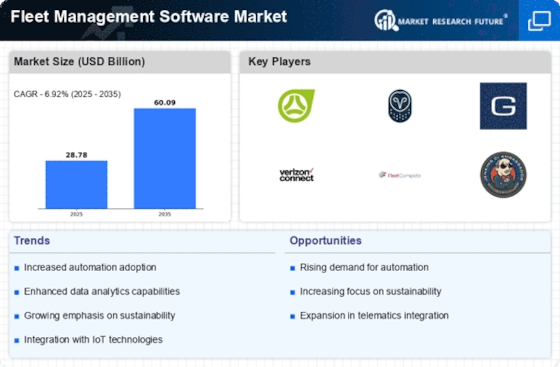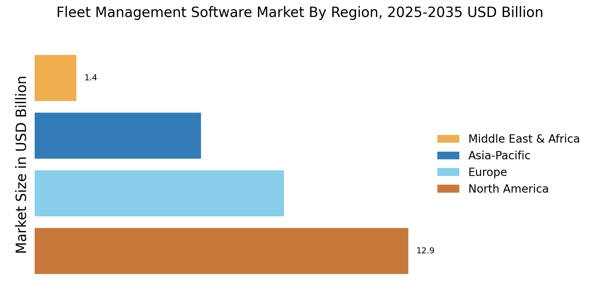Rising Demand for Operational Efficiency
The Fleet Management Software Market is experiencing a notable surge in demand for operational efficiency. Companies are increasingly recognizing the need to optimize their fleet operations to reduce costs and enhance productivity. According to recent data, organizations utilizing fleet management software can achieve up to a 20% reduction in operational costs. This trend is driven by the need for real-time tracking, route optimization, and maintenance scheduling, which are essential for maximizing fleet performance. As businesses strive to remain competitive, the adoption of advanced fleet management solutions becomes imperative. The integration of these technologies not only streamlines operations but also contributes to improved customer satisfaction through timely deliveries and enhanced service levels.
Growth of E-commerce and Delivery Services
The Fleet Management Software Market is witnessing substantial growth due to the expansion of e-commerce and delivery services. The rise in online shopping has led to an increased demand for efficient logistics and transportation solutions. Companies are investing in fleet management software to streamline their delivery processes, manage inventory, and optimize routes. Recent statistics indicate that the logistics sector is projected to grow by over 10% annually, further propelling the need for effective fleet management solutions. This growth is not only limited to traditional delivery services but also extends to last-mile delivery, where efficiency is paramount. As businesses adapt to changing consumer behaviors, the demand for sophisticated fleet management software continues to rise.
Regulatory Compliance and Safety Standards
The Fleet Management Software Market is significantly influenced by the increasing emphasis on regulatory compliance and safety standards. Governments worldwide are implementing stringent regulations regarding vehicle emissions, driver safety, and operational practices. Fleet management software assists companies in adhering to these regulations by providing tools for monitoring compliance and ensuring safety protocols are followed. For instance, the software can track driver behavior, vehicle maintenance, and fuel consumption, thereby reducing the risk of accidents and penalties. As a result, organizations are more inclined to invest in fleet management solutions that facilitate compliance, ultimately driving growth in the market. The potential for avoiding fines and enhancing safety measures makes this driver particularly compelling.
Technological Advancements in Fleet Management
The Fleet Management Software Market is significantly shaped by technological advancements that enhance fleet operations. Innovations such as telematics, artificial intelligence, and the Internet of Things (IoT) are transforming how fleets are managed. These technologies enable real-time data collection and analysis, allowing companies to make informed decisions regarding vehicle maintenance, fuel efficiency, and driver performance. The integration of AI-driven analytics can lead to a reduction in fuel consumption by up to 15%, showcasing the potential benefits of adopting advanced fleet management solutions. As technology continues to evolve, the market is likely to see an influx of new features and capabilities, further driving the adoption of fleet management software.
Focus on Cost Reduction and Resource Optimization
The Fleet Management Software Market is increasingly driven by the focus on cost reduction and resource optimization. Organizations are under constant pressure to minimize expenses while maximizing the utilization of their assets. Fleet management software provides tools that enable businesses to monitor fuel consumption, track vehicle usage, and analyze maintenance costs. By leveraging these insights, companies can identify inefficiencies and implement strategies to reduce costs. Data suggests that businesses can achieve a 10-15% reduction in fuel expenses through effective fleet management practices. This emphasis on cost efficiency not only enhances profitability but also encourages the adoption of fleet management solutions as a means to achieve sustainable growth.

















